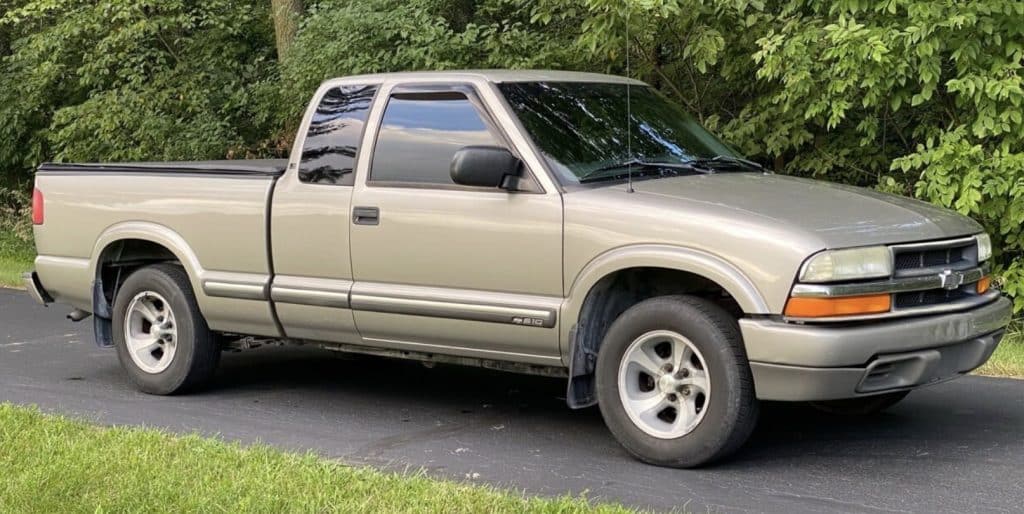
If you are hearing a grinding sound coming from your Chevy S10’s starter, it can be a cause for concern. But don’t worry, this article will help you understand the potential causes and how to fix them. We’ll discuss the most common causes and provide solutions so you can get your car back on the road.
The number one cause for a grinding noise, when you turn the key to start your S10 is a bad starter motor.
In the sections below, we cover all the main reasons.
If your S10’s starter is making a high-pitched clicking noise, that’s often a sign of low battery voltage. Check out the audio sample below.
1. Bad Starter
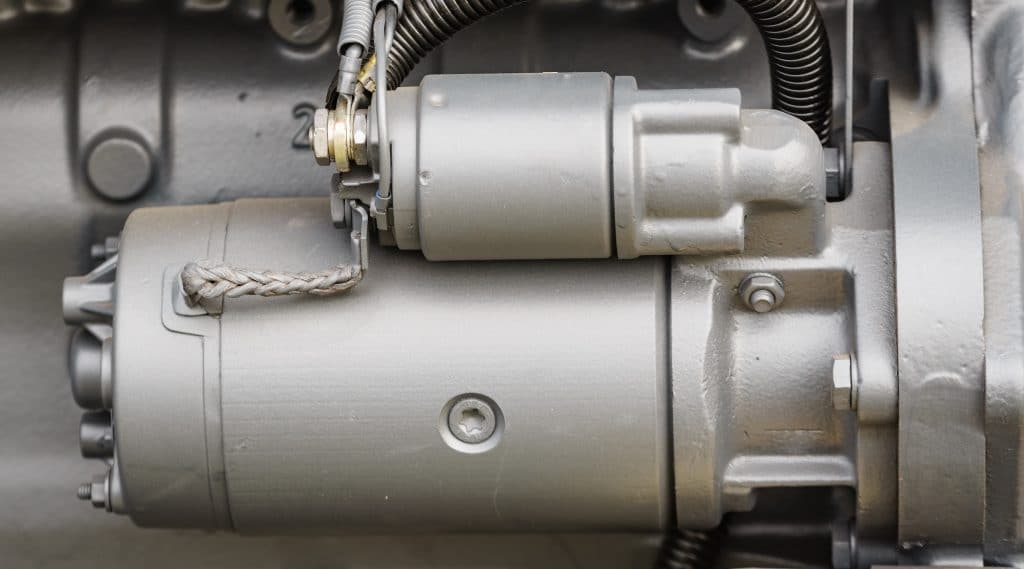
Starting your car should be a simple and easy task, but when you hear a grinding noise, it can be a sign of a problem. In this section, we will explore the most common cause of a grinding noise while starting: a bad starter. We will look at the three main causes: worn starter gears, a bad starter, and a faulty starter solenoid.
Worn Starter Gears
If you hear a grinding noise when starting your Chevy S10, it could be due to worn gears in the starter.
Over time, the teeth on the pinion gear can wear down or become damaged. This causes the pinion gear to not engage smoothly with the flywheel teeth, leading to the grinding noise.
To fix this issue, you may need to replace (the pinion gear or, realistically) the entire starter assembly.
Bad Starter Motor
Another possible cause of the grinding noise is a bad starter motor. The starter motor is responsible for turning the engine over when you turn the ignition.
If the motor is malfunctioning, it could struggle to turn the engine, creating a grinding sound. To resolve this problem, you will likely need to replace the starter.
Solenoid Issues (Sounds More Like a Ticking Sound)
Lastly, solenoid issues could be causing the grinding noise when starting your S10. The solenoid is an essential component that activates the starter motor when you turn the ignition.
If the solenoid isn’t functioning correctly, it can hinder the starter motor’s ability to engage, leading to the grinding noise.
In this case, you might need to either repair or replace the solenoid/starter to eliminate the noise and ensure smooth starts.
2. Starter and Flywheel Alignment Issues
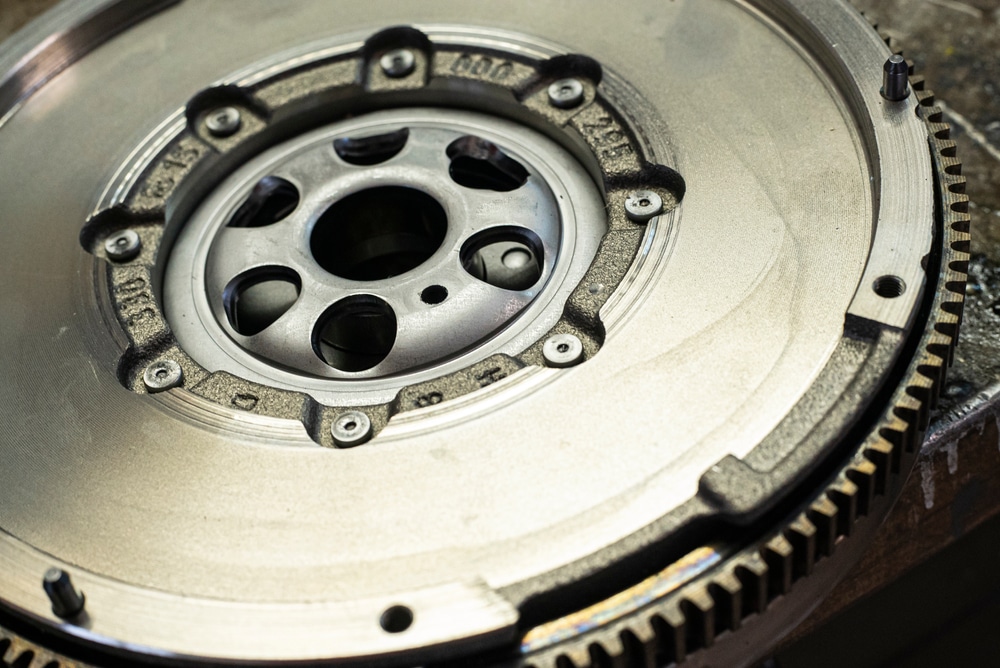
When it comes to a grinding noise when starting your Chevy S10, a common issue is related to the starter and flywheel alignment.
This problem often occurs after changing the starter. In this section, we will discuss the causes of starter and flywheel alignment issues and how to resolve them.
- Worn or misaligned gears: The starter motor engages with the engine’s flywheel to crank it and initiate combustion. If the starter motor’s gears are worn or misaligned, it can result in a grinding noise. To fix this issue, you may need to replace the worn gears or realign them to ensure proper engagement with the flywheel.
- Insufficient shims: On some motors, shims are used to align the starter with the flywheel. If there are no shims or not enough shims on your S10’s starter, it can lead to misalignment and, consequently, a grinding noise. To solve this problem, make sure to install the correct number of shims to achieve the right alignment. This is not an issue on a vehicle that’s never had a starter replaced.
3. Stuck or Frozen Starter
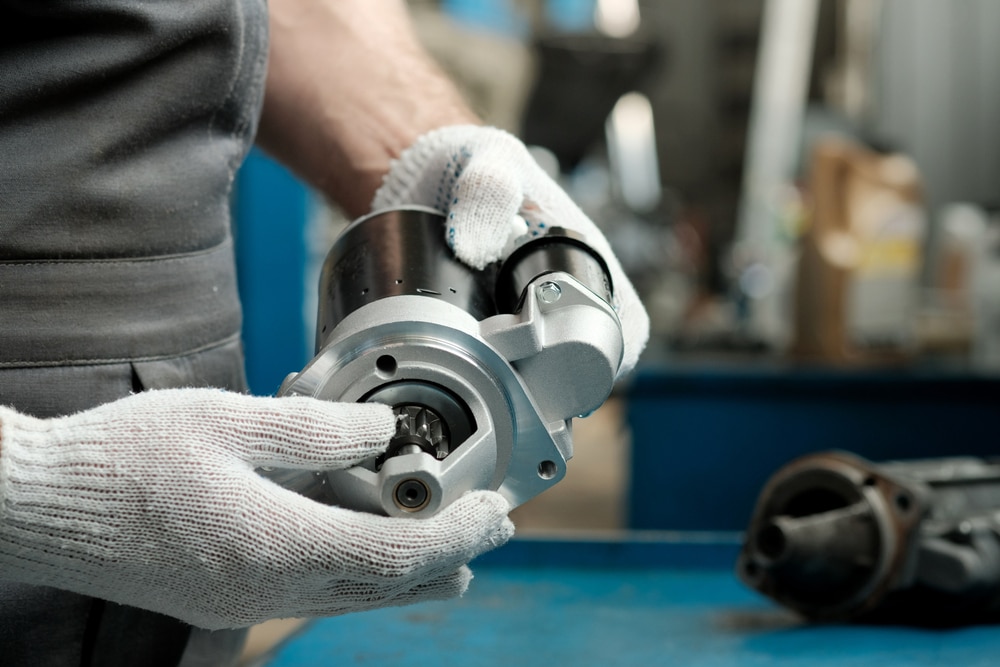
A stuck or frozen starter can cause a grinding noise when starting your Chevy S10. When this happens, you’ll usually hear one big clunk as the starter tries to move.
4. Flywheel or Flexplate Missing a Tooth
Sometimes, your Chevy S10 might produce a grinding noise when starting due to a damaged flywheel. The flywheel is an essential component that connects to the starter motor, helping crank the engine during the start-up process.
Here’s what you should know:
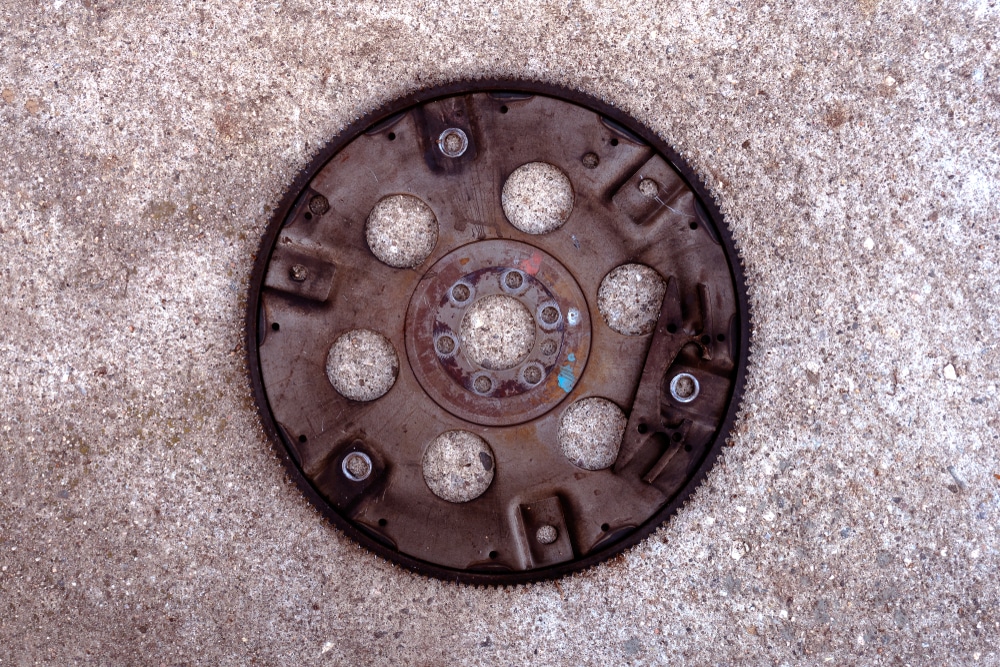
- Inconsistent starting: The flywheel has teeth, which make up the starting ring. The starter connects to this ring to turn over the engine. Over time, these teeth can break or wear down, leading to issues with engine start-up. If the starter attempts to engage with broken teeth, you’ll hear a grinding noise.
- Detecting a missing tooth: If you suspect that a missing tooth on the flywheel is causing the grinding noise, you can confirm by inspecting the flywheel through the starter hole or the flywheel inspection hole (if available). Look for broken or damaged teeth on the flywheel while turning it slowly.
- Possible causes: A flywheel missing a tooth could result from regular wear and tear or damage caused by a faulty starter motor. Inadequate lubrication or engine misalignment might also lead to rapid flywheel wear, resulting in missing teeth.
To address the grinding noise caused by a flywheel missing a tooth, you’ll need to replace the damaged flywheel. Additionally, it’s prudent to inspect the starter motor and other engine components for any damage, as issues with these parts could have contributed to the flywheel’s deterioration.
5. Low Battery Voltage
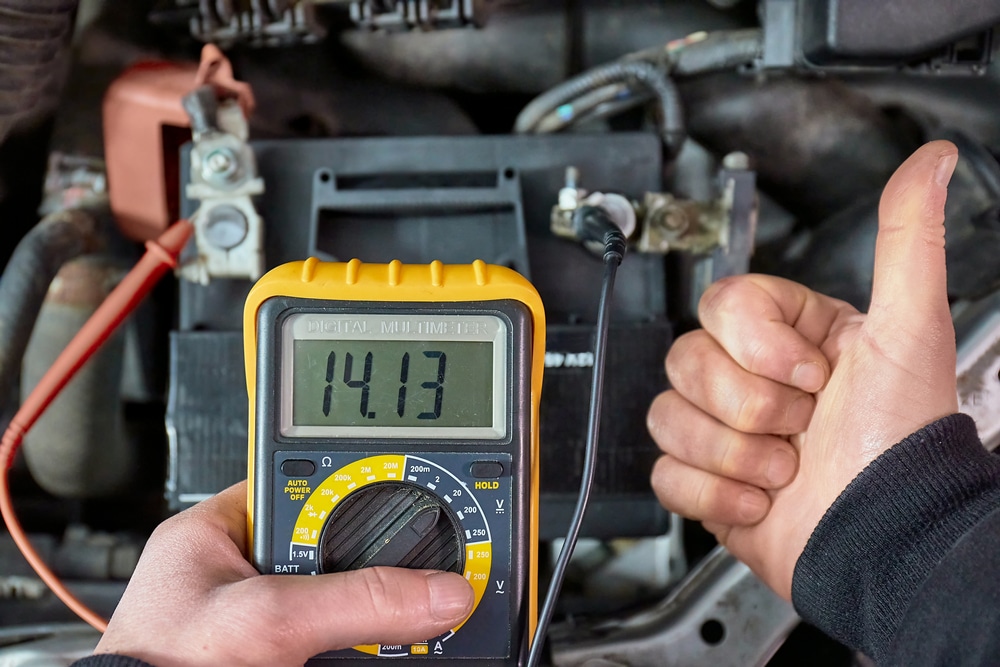
It is essential for your Chevy S10’s starter motor to receive adequate voltage from the battery in order to function properly. If your S10’s battery is weak, old, or not properly charged, it may result in the following issues:
- Insufficient power for the starter motor to engage the flywheel teeth smoothly, which can cause a grinding noise when starting your vehicle.
- Struggling to turn the engine over, leading to slow or unsuccessful start-ups.
To avoid these problems, you can take the following steps:
- Test the battery voltage: Use a multimeter to check your S10’s battery voltage. A fully charged battery should read around 12.6 volts, while a discharged battery will be below 12 volts.
- Check the battery’s age: Vehicle batteries usually have a life span of 3 to 5 years. If your battery is older, consider getting a replacement to ensure proper voltage supply to the starter motor.
- Inspect and clean battery terminals: Corroded or loose battery terminals can impede the flow of electricity from the battery to the starter motor. Make sure to clean and tighten them if necessary.
- Charge the battery regularly: Proper charging is crucial to maintaining a healthy battery. You should use a battery charger or drive your vehicle for an extended period to let the alternator charge the battery.
By ensuring your Chevy S10’s battery is in good condition and providing the necessary voltage to the starter motor, you can minimize the occurrences of grinding noise during start-ups and help prolong the life of your vehicle’s electrical system.
6. Engine Locked Up
Sometimes, a grinding noise when starting your Chevy S10 may be a symptom of a more serious issue – a locked-up engine. It’s important to identify the issue early on to avoid causing severe damage to your car. Below are key factors to consider if you suspect that your engine might be locked up.
- Check your oil: Low or no engine oil can cause your engine to seize or lock up due to excessive friction. Ensure your engine oil is at the proper level, and consider using a high-quality oil that meets the manufacturer’s specifications.
- Try to turn the engine manually: Carefully use a breaker bar or a socket wrench on the crankshaft pulley bolt, attempting to rotate the engine. If it doesn’t turn, your engine may be locked up, and you should have a professional assess the situation.
Diagnosis
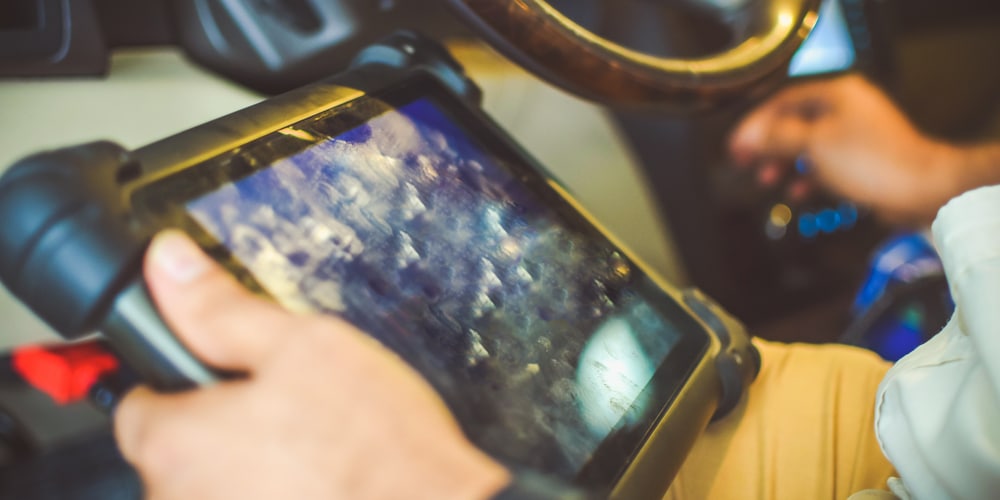
To diagnose the grinding noise when starting your Chevy S10, follow the steps below:
- Check the starter motor: The most common cause of a grinding noise during engine startup in Chevy S10s is a faulty starter motor. Inspect the starter motor’s gears for wear or misalignment, which could be causing the grinding noise.
- Inspect the starter solenoid: A faulty starter solenoid could also cause grinding noises. Examine the solenoid for damage or corrosion, and ensure that it is functioning correctly.
- Look for worn pinion drive gear: A worn pinion drive gear can lead to grinding noises during startup. Check the gear for wear and replace it if necessary.
- Make sure the starter motor is securely mounted: Loose mounting bolts on the starter motor can also lead to grinding sounds. Verify that all bolts are tightened properly and that the motor is securely in place.
By following these steps, you can effectively diagnose the cause of the grinding noise when starting your Chevy S10. Once you’ve identified the problem, make the necessary repairs or replacements to resolve the issue and prevent further damage.
How to Replace a Starter
Before you begin, gather the necessary tools such as a socket wrench set, pliers, a replacement starter, and a floor jack.
1. Disconnect the battery: First, ensure your safety by disconnecting the negative battery cable. This will prevent any electrical hazards while working under the hood of your Chevy S10.
2. Locate the starter: Find the starter under the vehicle, typically on the lower side of the engine. You might need to raise your S10 with a floor jack and secure it on jack stands for better access.
3. Remove electrical connections: Carefully disconnect the electrical connections on the starter. Remember to take a photo or make a note of their arrangement for easy reassembly.
4. Remove the starter: Use your socket wrench to remove the mounting bolts securing the starter to the engine block. Keep track of the bolts and any shims, as you’ll need them during the installation of the new starter.
5. Compare the old and new starters: Before installing the new starter, compare it with the old one to ensure they’re identical in size and mounting points. This will ensure a proper fit and prevent any issues after installation.
6. Install the new starter: Align the new starter with the mounting points on the engine block. Insert the mounting bolts and tighten them securely with your socket wrench. Reinstall any shims that were originally in place.
7. Reconnect the electrical connections: Refer to the photo or notes you took during disassembly to correctly reconnect the electrical connections to the new starter.
8. Reinstall the battery cable: Once everything is in place and connected, reinstall the negative battery cable to the battery terminal.
9. Test the starter: Start the engine to ensure the new starter is working correctly and that the grinding noise has been resolved.
Remember, safety is important throughout this process. Always follow proper guidelines and use the correct tools while working on your Chevy S10.
Conclusion
The Chevy S10 grinding sound when starting is a common problem, but one that can be easily fixed. In most cases, the grinding sound is caused by a faulty starter, or a worn flywheel or clutch. Replacing these parts can easily resolve the issue. However, if the grinding sound persists, it is important to have a professional inspect the vehicle for other possible causes. With the right diagnosis and repairs, the Chevy S10 can be back on the road in no time.

